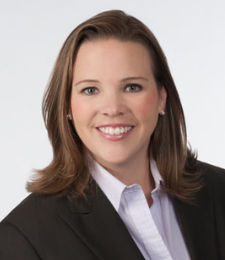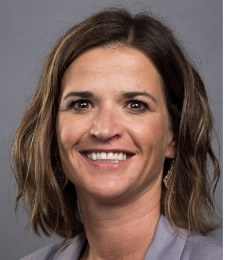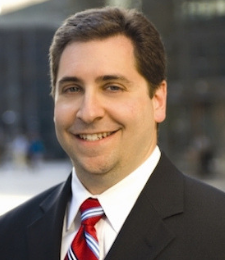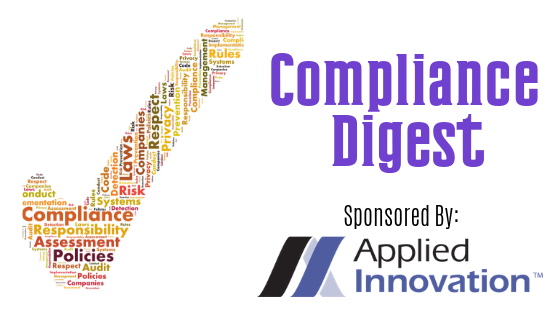Every week, AccountsRecovery.net brings you the most important news in the industry. But, with compliance-related articles, context is king. That’s why the brightest and most knowledgable compliance experts are sought to offer their perspectives and insights into the most important news of the day. Read on to hear what the experts have to say this week.
I’m thrilled to announce that Applied Innovation has signed on to be the new sponsor of the ARM Compliance Digest. Utilizing over 50 years’ experience in the collections industry and over 75 in technology, Applied Innovation is helping to shape the future of accounts receivable management.
Judge Grants MSJ in FDCPA Case Because Call Logs Contradict Plaintiff’s Testimony
Determining that a plaintiff’s recollection of how many calls he purported to receive and how many times he told a debt collector to stop calling because it had the wrong number was “blatantly contradicted” by his own phone records and those of the collection agency, a District Court judge in Michigan has granted the defendant’s motion for summary judgment. More details here.

WHAT THIS MEANS, FROM DAVID KAMINSKI OF CARLSON & MESSER: This is a classic case of a plaintiff’s counsel abusively overreaching, when the facts and evidence clearly contradict his client’s testimony. Here, the evidence, and specifically plaintiff’s own evidence, unequivocally demonstrated that plaintiff did not receive the number of calls claimed, and that there was only one live call where plaintiff told the agency they had the wrong number. There were no calls thereafter. Faced with this evidence, plaintiff’s counsel should have dropped this case. Instead, he pushed frivolous FDCPA claims that were ludicrous, in light of the undisputed evidence.
In a case such as this, obtaining the phone records of the plaintiff, maintaining robust agency records, including the subject recording of the call at issue, is paramount!
I have always been an advocate of recording calls, because the recording here provided critical evidence, combined with the other records, that helped pave the way for the favorable defense ruling. However, it is imperative to maintain recordings and other records for a long enough period of time to cover almost any consumer claim, especially where some state law claims have statutes of limitations up to six years. As we see routinely, “evidence” is the key to fighting frivolous lawsuits from the plaintiff’s bar. And, vigorously defending junk claims such as these and winning sends a clear message to the plaintiff’s bar that agencies are not going to roll over and pay on frivolous suits, solely because it is more cost effective to settle.
THE COMPLIANCE DIGEST IS SPONSORED BY:
Company Being Sued by CFPB Opposes Agency’s Request For Stay Before Appeals Court
A company that is being sued by the Consumer Financial Protection Bureau for allegedly scamming first responders and players in the National Football League has opposed a motion filed by the CFPB seeking to stay arguments in its case pending the outcome of the Supreme Court’s decision in Seila Law v. CFPB, because its case avoids the constitutional questions being discussed about the CFPB before the Supreme Court. More details here.

WHAT THIS MEANS, FROM JOANN NEEDLEMAN OF CLARK HILL: A cloud of uncertainty hangs over the Consumer Financial Protection Bureau (CFPB) given the announcement by Director Kraninger that the Bureau’s work and mission will continue and remain unchanged despite the fact that it supports the position of the Department of Justice that the Bureau’s single director structure is unconstitutional. The CFPB’s current position in the RD Legal case to support a stay of proceedings is somewhat of a head-scratcher in light of its position in the Forster & Garbus case where the Bureau adamantly opposed such a stay. Although RD Legal is in the appellate phase, it is unclear what the CFPB’s enforcement strategy is at the moment. There is currently only a handful of pending enforcement actions with the CFPB. A few cases were filed as recently as August and in late September, so it may be too soon to tell whether any of the parties will seek of stay of these proceedings.
Some in the industry opine that defendants should seek a stay to their proceedings until SCOTUS, and possibly Congress, figures out the fate of the Bureau while others see it as an opportunity to seek a quick and favorable resolution with CFPB. The best course of action depends on the varying factors specific to each case. Certainly assessing the claims that are being asserted and how the Bureau intends to prove those claims is a good starting point. However, prior to the Bureau’s change in position regarding its structure, it was pretty evident that the Bureau took an aggressive position when it came to enforcement and supervision, and targets responded accordingly. Now, determining how to engage the Bureau may be a bit more ambiguous given the Bureau’s inconsistency in its position.
Furthermore, the fate of the proposed debt collection rule may be equally murky. Undoubtedly, the Bureau will publish a final debt collection rule, but whether that rule will become effective is tenuous. While industry will leverage the Bureau’s uncertainty in areas of enforcement and supervision, consumer advocates may do the same in areas where they do not support the Bureau’s proposals. The advocates have clearly stated in their comments to the debt collection rule that the Bureau needs to start over. The Bureau’s position with regard to their structure may be the advocate’s vehicle to achieve that objective.
Judge Denies Motion to Enjoin CFPB From Seeking Information From Third Parties
A District Court judge in the District of Columbia has denied a defendant’s motion to enforce a modified civil investigative demand from the Consumer Financial Protection Bureau because what the CFPB is doing was not prohibited under the terms of the modified CID. More details here.

WHAT THIS MEANS, FROM MICHAEL KLUTHO OF BASSFORD REMELE: CFPB performs an end run. An entity that was the subject of a CID mediated the scope of the CID to limit it to certain information. Believing it had successfully limited the reach/scope of the CID, the entity under investigation was shocked to learn that the CFPB nonetheless sought the very information the entity thought was off limits — by going directly to the entity’s customers. The investigated entity therefore went to court seeking to stop the CFPB’s end run. The court declined its request. The court indicated that the investigated entity should have specifically negotiated the further limitation it now sought (i.e.,, “hey, CFPB, you can’t get this info from our clients either”) when it earlier mediated the scope/limit of the CID via mediation with the CFPB.
The takeaway? Play chess and not checkers. It’s understandable why the entity felt it had successfully limited the reach of the CID, but we now know that for all future such negotiations, you need to think at least five moves ahead to be sure you are truly limiting the investigation.
DeVos Fined $100k For Violating Judge’s Order to Stop Collecting Certain Student Loans
A federal judge in California has imposed a $100,000 fine on Education Secretary Betsy DeVos after ruling she was in contempt of court for continuing to collect on student loans even though a court order had prohibited her from doing so. More details here.

WHAT THIS MEANS, FROM BRIT SUTTELL OF BARRON & NEWBURGER: The sanctions order seems shocking when taken in isolation, but the judge signaled her displeasure and the likelihood that sanctions would be handed down in a court filing two weeks earlier. In the Oct. 8 filing, the judge stated that she was “deeply disturbed” by the Department of Education’s failure to comply with the injunction order. Additionally, the fact that the Department of Education disclosed that at least 16,000 students were affected by the failure to comply with the court’s previous order did nothing to help the situation. While the Department of Education claims it communicated with its servicers regarding the injunction, the record reveals that those communications were scant at best. The Department of Education failed to provide its servicers with specific instructions for postponing payments from the harmed consumers. There are several takeaways for the industry. First, on the creditor side, when a court orders compliance the company should do everything it can to comply with the order, including passing along any orders to vendors who may be affected. Second, when communicating with vendors, it is important that the information and instructions are clear so that there can be no question as to whether the instructions are followed. This would include providing an open forum for questions from vendors as well as follow-up from the creditor to confirm its instructions have been followed; in some cases, perhaps even additional auditing of the vendor may be appropriate. This case is a clear example of what happens when a creditor fails to communicate effectively with its vendors and servicers.
Appeals Court Rules Certain Student Loans Can Be Discharged During BK
The Court of Appeals for the Fifth Circuit has ruled that a bankruptcy court did not err in discharging certain types of student loans during bankruptcy proceedings and that a bankruptcy court does not have the authority to enforce discharge injunctions entered into in other courts, remanding the case back to the District Court. More details here.

WHAT THIS MEANS, FROM LAUREN VALENZUELA OF PERFORMANT: This case came about because two closed Chapter 7 bankruptcies, in different jurisdictions, both had generic discharges that did not specify the debts discharged. The plaintiff-debtors in those closed bankruptcies both had private student loans. The Bankruptcy Code has a statutory exemption for student loans (more specifically, for an “educational benefit”). Accordingly, one of the central questions was whether the generic discharges included discharge of their private student loans. This case illustrates a significant difference between federal and private student loans. Simply put, private student loans are more easily dischargeable in bankruptcy because they are not statutorily excepted from discharge like federal student loans are. For example, a person with a private student loan does not have to show that repayment would impose an “undue hardship” in order to overcome the statutory exemption like a person does for federal student loans. The Court reminded its audience that all exceptions are to be “interpreted narrowly in favor of the debtor to preserve the ‘fresh start’ the Bankruptcy Code provides for debtors.”
Appeals Court Upholds MSJ in FDCPA Case Over Partially Discharged Debt
The Court of Appeals for the Third Circuit has issued a non-precedential ruling that upholds a lower court’s decision to grant summary judgment in favor of a defendant that was sued for violating the Fair Debt Collection Practices Act by mis-stating that amount that was owed. More details here.

WHAT THIS MEANS, FROM BRENT YARBOROUGH OF MAURICE WUTSCHER: The Third Circuit affirmed, in a non-precedential opinion, that the debtor’s post-discharge condominium assessments fell under the exceptions to discharge, thus it was not unlawful for the condominium association’s law firm to collect them or to represent that the debtor is liable for those assessments. The documents sent to the debtor reflected varying amounts due; and one document prepared by the firm’s client showed the entire debt, including amounts that were discharged in bankruptcy. The debtor tried to build a case out of these documents, which he alleged were misleading, but the documents also noted that the amount sought did not include the portion of the balance that was discharged in bankruptcy. This clarification helped the firm prevail on summary judgment and again on appeal. Perhaps a more robust explanation would have helped the firm avoid this suit altogether, but occasionally you run into a consumer who is determined to sue and then, as happened here, keep after it with numerous post-judgment motions and an appeal.
Supreme Court Picks Lawyer Who Will Defend CFPB in Seila Law Case
The Supreme Court has chosen Paul Clement, a former solicitor general under President George W. Bush, to defend the current leadership structure of the Consumer Financial Protection Bureau in the case of Seila Law v. CFPB. The choice was necessary because the CFPB — along with the current solicitor general — have sided with Seila Law in determining that the current leadership structure of the agency is unconstitutional. More details here.

WHAT THIS MEANS, FROM STEFANIE JACKMAN OF BALLARD SPAHR: Paul Clement is a very experienced Supreme Court advocate who is often appointed by the Court to argue cases as amicus curiae. Although he typically handles cases for industry, it is not unusual for him to argue cases on behalf of consumers. In my view, this bodes well for ensuring the Court receives thorough, well-reasoned, comprehensive briefs from both sides and enable the Court to reach an informed decision. Considering the importance of this case– not just with regard to the future of the CFPB, but potentially, even more broadly to the functioning of other independent agencies, as well as the scope of the doctrine of severability – ensuring a consideration of all potential arguments and impacts is critical to enabling the Court to render a defensible, well-reasoned opinion. By appointing Mr. Clement, the Court ensured that in addition to the thoughtful and compelling arguments the CFPB and Solicitor General will likely present, that thoughtful and compelling counterarguments also will be before the Court, enabling the justices to exercise the Court’s judicial responsibilities properly and in accordance with the mandates of the Constitution.
Judge Grants MSJ For Defendant in FDCPA, FCRA Case Over Different Debts
A District Court judge in Missouri has granted summary judgment to a defendant accused of violating the Fair Debt Collection Practices Act because it treated two debts from two different medical providers — originating from the same hospital visit — separately when trying to collect. More details here.

WHAT THIS MEANS, FROM LAURIE NELSON OF PAYMENTVISION: This case provides a correct outcome under the FDCPA that is good for creditors. If the court had ruled for the Plaintiff, this would have created yet another new burden on creditors. In this case we are not questioning whether debt was validated or within the statue of limitation but rather if the creditor is required under the FDCPA to review not only the specific debt that is disputed by a debtor but all debts even those not specifically disputed for that debtor. Thankfully, it validates the direction that If the same debt collector is attempting to collect multiple debts from you the debtor must dispute each debt separately. The collector will then be obligated to provide separate validation information for each one.
This holding reminds all that in addition to protecting the debtors, the FDCPA also attempts to avoid “imposing unnecessary restrictions on ethical debt collectors.” Peter v. GC Services, L.P., 310 F.3d 344, 351-52 (5th Cir. 2002) (quoting S. Rep. No. 95-382, at 1-2, reprinted in 1977 U.S. Code Cong. & Admin. News 1695, 1696). The debtor’s obligation to dispute each debt individually is not an unnecessary burden as, in comparison, the collector’s obligation to validate each debt is also not an unnecessary burden. While in the courts, the interpretation of the FDCPA’s requirements and application of the “least sophisticated consumer” standard can get quite complicated; this is an instance where it seems pretty straight forward.
DeVos, Ed. Dept., Sued By Mass. AG, More Corinthian Students For ‘Aggressive’ Collection Efforts
A group of 7,200 former Corinthian College students, along with the attorney general of Massachusetts filed lawsuits yesterday against Education Secretary Betsy DeVos and the Department of Education, accusing it of not following the law by refusing to cancel fraudulent student loans that were made to the plaintiffs. More details here.

WHAT THIS MEANS, FROM HELEN MAC MURRAY OF MAC MURRAY AND SHUSTER: Massachusetts AG Maura Healey takes great pleasure in finding any reason to sue the Trump administration, but this one is a good one. Healey has the courts already backing her up on this one. In talking with many state AGs of both parties, student loan debt issues are top priorities. Debt collectors and debt buyers should be particularly aware of these issues and how it may contribute to the validity of the debt they are collecting or buying.
House Being Lobbied to Enact Law Changing CFPB Leadership Structure
A lobbying effort has begun on Capitol Hill to persuade the House of Representatives to enact legislation that would change the leadership structure of the Consumer Financial Protection Bureau to a five-member commission from its current one-person-at-the-top formation. More details here.

WHAT THIS MEANS, FROM ETHAN OSTROFF OF TROUTMAN SANDERS: The move of the House of Representatives to defend the single director structure in Seila Law v. CFPB is an interesting one. In defending the structure of a single director who can only be fired for cause, the House is arguably fighting for a swing between more restrictive and less restrictive regulation every five years when a director’s term expires, depending on which party holds the presidency, thereby contributing to the volatility of the agency’s policies regulating the financial services industry.
Regardless of whether a single director who can only be fired for cause is constitutional, an agency with the power of the CFPB should be governed by a more stable structure — perhaps a five-member board à la other independent agencies? To this point, the industry has been pushing for such a change, as evidenced by the recent lobbying efforts to persuade the House to enact legislation to change the governing structure of the CFPB to a five-member board. The Consumer Bankers Association in particular has opined that a five-member board/commission would depoliticize the agency and promote consistency and transparency that would aid the industry in planning for the future. Given that the Supreme Court has recently granted certiorari in Seila Law v. CFPB, the change sought may be made without Congressional action.
Looking to Seila Law v. CFPB, the 9th Circuit did not appear to find much difficulty in declaring that the single director structure of the CFPB to be constitutional. The Supreme Court in its current form, however, may be keen to disagree. Looking to then-Judge Kavanaugh’s dissenting opinion in PHH Corp. v. CFPB in 2018, one major constitutional flaw he levied at the CFPB was that, unlike other independent agencies, the CFPB is governed by a single director who can only be removed for cause as opposed to the five-member board structure atop other independent agencies. While what the Court will ultimately do is unknown, the granting of certiorari in conjunction with Justice Kavanaugh’s recent 2018 dissent criticizing the constitutionality of the CFPB’s governing structure may telegraph that changes are coming for the CFPB – one way or another.
N.J. Sued Over Language Access Law; May Have Implications for ARM Industry
A battle is brewing in New Jersey over a newly enacted state law that could potentially impact the credit and collection industry both in the Garden State as well as other states across the country. More details here.

WHAT THIS MEANS, FROM RICK PERR OF FINEMAN KREKSTEIN & HARRIS: Collection agencies are no strangers to communicating with consumers with limited English proficiency (LEP). Most agencies utilize bi-lingual employees or enlist the services of affordable translation companies. It is smart business.
The State of New Jersey, however, just raised the ante. A new law requires the three major consumer reporting agencies (CRA) to publish credit reports in up to 10 different languages at the request of the consumer. Regardless of the legality of this measure (possibly pre-empted by the FCRA), it marks a growing trend of government intervention in communicating with those having LEP. New York just completed a study of the collection industry and concluded enough is not being done.
The ARM industry can expect that this wave will soon encompass not just oral, but written communication as well. It is time to get prepared.
Thanks again to Applied Innovation — the team behind ClientAccessWeb, Papyrus, PayStream, and GreenLight — for sponsoring the Compliance Digest.










